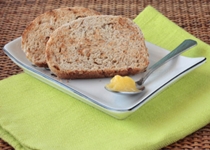 Saturated fats often get a bad rap. Claims over the last 30 years have falsely linked fat and saturated fats to an increased risk of heart disease, obesity, and high cholesterol.
Saturated fats often get a bad rap. Claims over the last 30 years have falsely linked fat and saturated fats to an increased risk of heart disease, obesity, and high cholesterol.
But that’s not always true. Fat is actually vital to a healthy diet, and the right types of saturated fats can even provide important health benefits. For thousands of years, the ancient traditions of yoga and Ayurvedic medicine have referred to a particular saturated fat as “liquid gold” with incredible healing powers.
I swear by this fat, and I’ll use it in smoothies and soups, or to enhance the flavor in rice dishes. It is the most common cooking oil in India, and it is known for its deliciously sweet flavor. I was even shocked when I first learned that this saturated fat can even reduce your risk of heart disease. What is it? It is clarified butter, commonly known as ghee.
In an article published in the journal Ayu, animal and human studies found that the regular consumption of ghee could lower your risk of cardiovascular disease. In rats, the ghee also remarkably decreased serum total cholesterol, triglycerides, low density lipoprotein (LDL), and very low density lipoprotein (VLDL), which are all factors for an increased risk of atherosclerosis and heart disease.
A preliminary study published in the Journal of Dairy & Bioscience also showed that high doses of medicated ghee helped to lower serum cholesterol, cholesterol esters, triglycerides, and phospholipids in patients with psoriasis, which supports a decreased risk of developing heart disease.
Ghee has also been shown to improve the appearance of skin, reducing pruritis (itching), scaling, and erythema (redness). The conjugated linoleic acid (CLA) in ghee can also reduce inflammation. As a result, heart disease may be prevented.
A prevalent study on ghee, published by the journal Ayu, also supported the health benefits of ghee. Contrary to recent beliefs regarding the health effects of all fats, researchers from Ohio State University and South Dakota State University found that 10% dietary ghee did not increase the serum total cholesterol levels or the risk of heart disease in rats during a four-week period. The study also observed that ghee did not raise lipid peroxidation processes, which are linked to a high risk of cardiovascular disease.
Finally, I recall a study that split participants into two groups—1,200 men consumed less than one kilogram of ghee per month and 782 men consumed a minimum of one kilogram of ghee on a monthly basis. Researchers found that the risk of coronary heart disease was lowered when men consumed at least one kilogram of Indian ghee on a monthly basis.
Having said all that, there are some things you need to consider when adding ghee to your diet.
Ghee alone is not known to contain trans fats; however, vegetable ghee contains 40% trans fats. This explains the rise in coronary artery disease cases in Asian Indian cultures that consume mostly vegetable ghee.
What makes clarified butter different from regular butter is that ghee has removed the casein protein, lactose, and other dairy solids, so it can serve as a good butter substitute for those who are lactose-intolerant.
Ghee is also pure butterfat and can be used for cooking at higher temperatures, with a smoke point of 485 degrees Fahrenheit. Butter will often burn at high temperatures.
Ghee also has several other health benefits. Ghee is known to:
- Aid digestion
- Enhance your memory and intelligence
- Treat anemia, blood disorders, and chronic fevers
Ghee is also high in butyric acid, a short-chain fatty acid that inhibits cancer growth and contains antiviral properties. Butyric acid can also prevent and reverse the effects of weight gain.
Sounds like “liquid gold” to me. But where do you find such a powerful food? I typically get mine at my local health food store.
Sources for Today’s Article:
Kumar, M.V., et al., “Effect of dietary ghee—the anhydrous milk fat, on blood and liver lipids in rats,” The Journal of Nutritional Biochemistry February 1999; 10(2): 96–104.
Gupta, R., et al., “Association of dietary ghee intake with coronary heart disease and risk factor prevalence in rural males,” The Journal of the Indian Medical Association March 1997; 95(3): 67–69, 83.
Sharma, H., et al. “The effect of ghee (clarified butter) on serum lipid levels and microsomal lipid peroxidation,” Ayu April to June 2010; 31(2): 134–140, doi: 10.4103/0974-8520.72361.
Lad, V., Ayurveda: The Science of Self-Healing (Twin Lakes: Lotus Press, 2004), 135–136.
